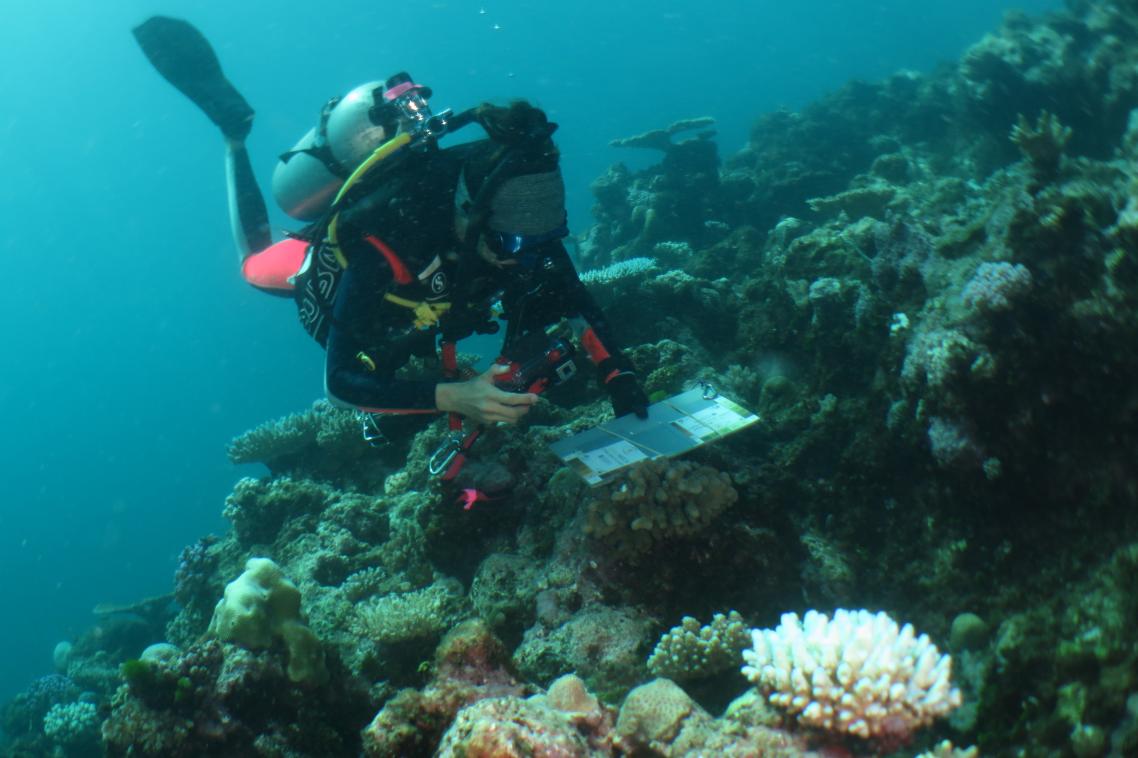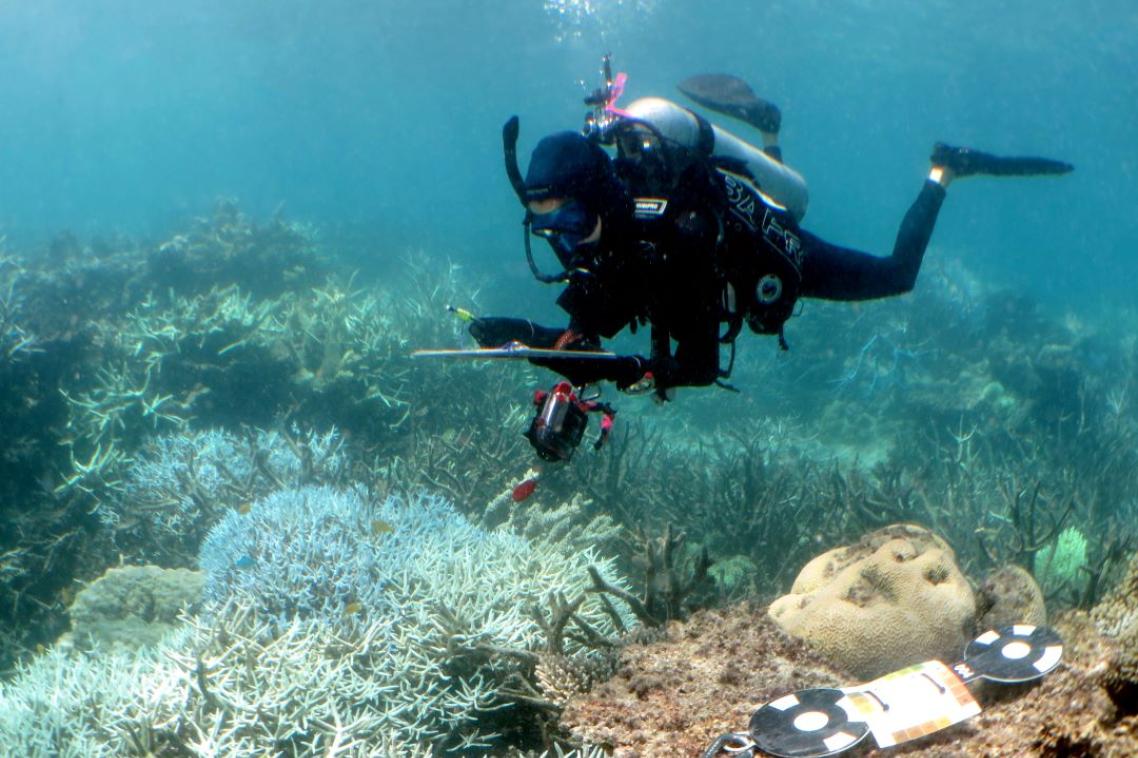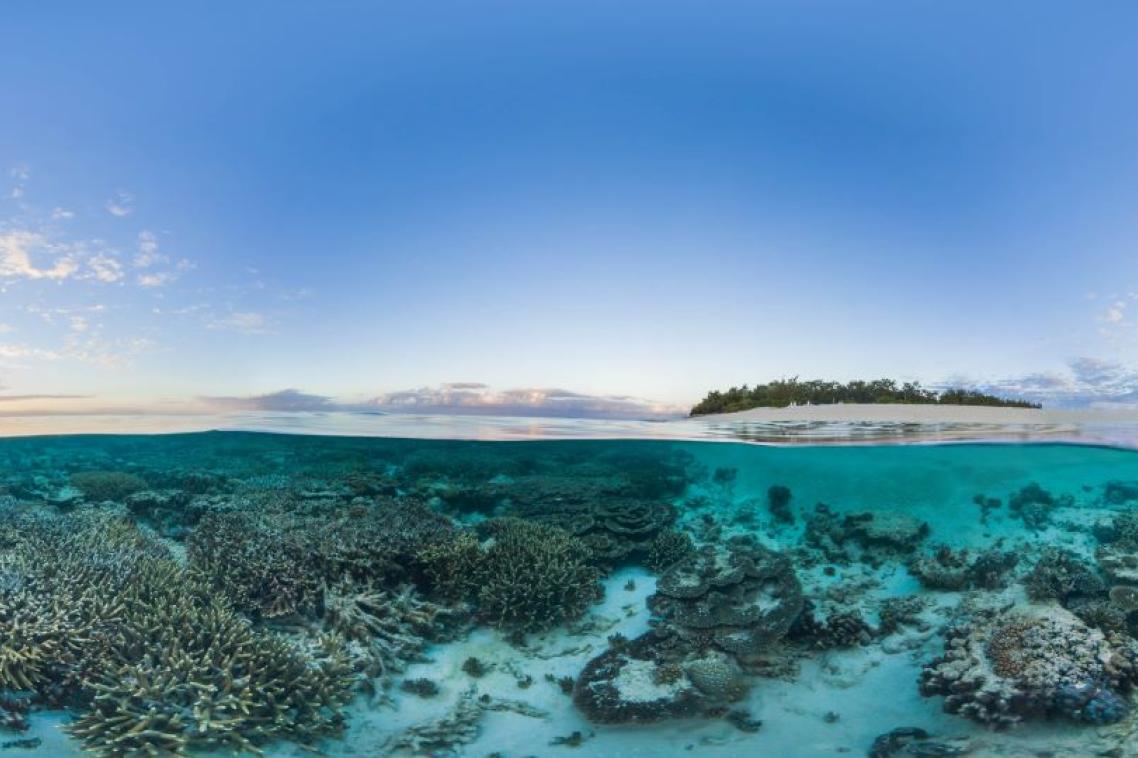Under the surface: how genetics could save the Great Barrier Reef

UQ researchers are uncovering the mysteries of coral genetics to help us better understand them to protect and restore the reef.
(Photo credit: Zoe Meziere )
Key points
- UQ researchers are uncovering the genetic mysteries of the Great Barrier Reef to help in restoration and adaption work.
- Despite looking identical to the naked eye, some coral species are genetically distinct. This can impact reef restoration work if the wrong species is introduced in the wrong location.
- UQ and AIMS have signed a memorandum of understanding to continue our joint research into coral, the reef and marine science.
Researchers from The University of Queensland and Australian Institute of Marine Science (AIMS), have a long-standing collaboration and are uncovering the mysteries of coral genetics at the Heron Island Research Station.
Ranging from what makes a coral more resistant to a warming ocean, to how identical looking corals can be completely different species, these discoveries could help scientists repopulate a more resilient reef.
Diving into the gene pool
Growing up in the French Caribbean island of Guadeloupe, UQ research officer Zoe Meziere first dived to see a reef aged just 10. It changed her life.
“I fell in love with reefs at a young age. The Caribbean reefs are now very damaged, but when I was 10, they looked amazing. I don’t know if it was the benefit of youth, or they were in better condition than they are now,” she said.
As an adult she was drawn to reefs and wanted to know how to preserve them. For many, coral restoration – rehabilitating heat wave damaged reefs – was the answer. But Ms Meziere was not convinced it would be effective while the root cause, climate change, was unaddressed.
“I questioned what happens if we restore the reef, then there is another heat event? What happens after that?” she said.
“But we are at the point where restoration and adaption might be the only option. So, we need to know about the corals and their genetic make up. That fundamental science is so important to make sure we are doing the right thing.”
For Ms Meziere, understanding corals' genetics and evolution is the key to helping the reef.
After studying a Masters in Evolutionary Biology at the University of Uppsala in Sweden and at Ludwig Maximilian University in Germany, Ms Meziere wanted to bring that expertise to her passion for coral reefs.
"I wanted to merge my passions for marine environments and evolution. I wanted to understand why reefs are such diverse ecosystems," she said.
Ms Meziere, who completed her PhD at UQ this year, has investigated the reasons some corals handle heat waves better than others (the answer: "there doesn't seem to be just one genetic reason some corals bleach easily and some are more resilient."), how far coral larvae travel on the reef, and why genetically distinct lookalike species complicate restoration.
Corals can be incredibly hard to identify. Specimens that look the same can be as genetically different as humans and neanderthals. These ‘cryptic’ species are a problem when trying to restore coral populations in the reef.
If you introduce corals that look like those that are species native to an area, but are genetically different, they may not be able to breed. Alternatively, they may end up competing for resources and be detrimental to the native species.
Ms Meziere’s thesis was funded through the Reef Restoration and Adaptation Program (RRAP), a consortium dedicated to creating an innovative toolkit of safe, acceptable interventions to help the Reef resist, adapt to, and recover from the impacts of climate change. The Program is funded by the partnership between the Australian Government’s Reef Trust and the Great Barrier Reef Foundation, partners include the Australian Institute of Marine Science, the Great Barrier Reef Foundation, CSIRO, The University of Queensland, QUT, Southern Cross University and James Cook University.

UQ researcher Zoe Meziere is studying the genetic make up of corals.
(Photo credit: Zoe Meziere )
What lies beneath
At first glance, many corals seem identical - but genetic testing reveals some specimens we thought were the same species are in fact completely unrelated.
These ‘cryptic’ species often emerge when populations adapt to local conditions or diverge over time, even while looking the same. Knowing which coral belongs where is key to giving the reef a fighting chance.
UQ School of the Environment Professor Cynthia Riginos said uncovering coral genetic patterns can guide coral restoration to be more targeted, matching the right species for the right place.
“If we try to restore an area with a species that is mismatched to that location, it’s likely they will die. If the same coral species is not in the receiving region, then the restored corals will have few opportunities for mating,” she said.
“Cryptic species are very common in corals. You can take two specimens of a coral that we think are the same species then we start doing genetics and find out they are actually different.”
Professor Riginos works across UQ and AIMS where she is a Senior Principal Research Scientist. This year UQ and AIMS formalised their long-standing collaboration, aiming to accelerate discoveries that could help save the reef.
"Much of the reef restoration and adaption work is being carried out by AIMS. But fundamental science behind it is also being done at UQ and other universities," she said.
"Researchers here are carrying out experiments to learn the important lessons we need to understand for restoration to succeed."
UQ and AIMS have signed a Memorandum of Understanding to deepen their joint research projects.
(Photo credit: Zoe Meziere )
Taking aim
UQ and AIMS have been working to better understand corals and reefs for years, sharing academic expertise as well as research infrastructure.
AIMS Reef Recovery, Adaptation and Restoration Research Program Director Dr Line Bay said the partnership was helping to train the next generation of scientists to help save the reef.
Dr Bay said AIMS and UQ’s work was helping scientists better understand corals and how to restore reefs globally.
“To the naked eye corals look like colourful rocks, but they are incredibly complex animals. They can be amazing and frustrating at the same time,” she said.
Dr Bay said the genomics work being done at UQ by researchers including Professor Riginos and Ms Meziere is helping scientists understand where corals have come from, their migration history and the relationships between species.
“That is absolutely essential information - if you want to manage corals or do any restoration or adaption activities. Our collaboration has really added a lot of knowledge in that space,” Dr Bay said.
“We've sequenced the genomes of about 6000 corals in the Great Barrier Reef. This is a globally significant effort that is going to catapult our understanding of the genetic makeup of corals.”
UQ’s Professor Peter Mumby, who sits on the RRAP Steering Committee, said UQ research is helping understand the fundamentals of corals and the future of the reef.
Along with work into the ecology of corals, UQ researchers have developed a simulation of the reef to understand its future, while others have written a book using international science on how to stabilise coral rubble long enough to allow a reef to regrow.
“Even though UQ and AIMS have been working together for years, RRAP really gave us a formal structure,” he said.
“We’ve developed a really strong relationship over the years. A lot of PhD students come out of UQ’s research labs and go into roles at AIMS. We’ve had multiple students from my lab alone, plus more from others at UQ, go to working for AIMS.”

Research into corals is being carried out on UQ's Heron Island Research Station.
(Photo credit: Zoe Meziere )
Turning the tide
As long as climate change is causing heat events the Great Barrier Reef will be at risk. But our scientific understanding of coral and reef restoration is advancing faster than ever.
With AIMS and UQ deepening their partnership to broaden our understanding of the reef and other marine environments, that scientific understanding will continue to grow. With each new discovery, researchers are rewriting the future of coral reefs.
For Professor Riginos, as a joint UQ-AIMS employee, the growing connections between the two institutions are helping give the Great Barrier Reef the best possible chance at recovery.
“Being able to work at UQ and AIMS creates so many important synergies. At UQ I can stay connected with world leading experts in diverse scientific fields and work with outstanding students,” she said.
“And at AIMS I work with some of the world’s best coral reef scientists where we can target our efforts towards solving specific problems such trying to improve outcomes for the GBR and other coral reefs.”
Through careful research and collaboration, restoration and adaptation interventions can now be guided by science, giving the Great Barrier Reef a chance to thrive.
As part of our vision of knowledge leadership for a better world we encourage others to republish our news articles online or in print under our Creative Commons licence. You must follow these guidelines ensuring that you credit UQ and our authors, include a link back to the original article and don't make material edits.
By copying the article code, you will be adhering to the UQ Guidelines.
Related articles

Coral larvae travelling further makes populations stronger

Satellites a solution for tracking coral reef health
Media contact
UQ Communications
communications@uq.edu.au
+61 429 056 139
Subscribe to UQ News
Research with us
Pursue your passion for research at UQ with a PhD, Master of Philosophy or professional doctorate.
